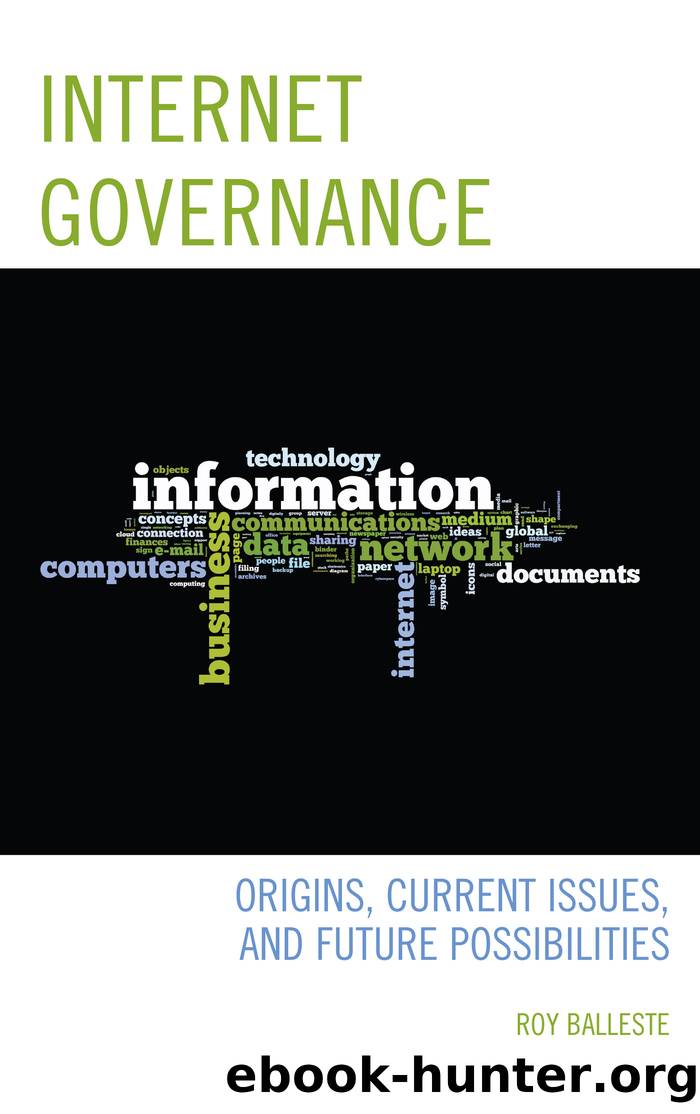Internet Governance by Roy Balleste

Author:Roy Balleste
Language: eng
Format: epub
Tags: undefined
Publisher: Rowman & Littlefield Publishers
Published: 2012-08-15T00:00:00+00:00
The audience at the session applauded. The exchange recorded by the transcript proved that human rights had lacked long-overdue discussions. During this same IFG session, Richard Sambrook (director of news for the BBC and vice president of the European broadcasting union) had a similar view; he saw a collision of business interests with the principles of freedom of expression, explaining that some IT companies had accepted “a little progress” as better “than no progress.” Other participants shared their ideas—particularly Vinton Cerf, Google’s Chief Internet Evangelist, who explained that Google’s practice was one of providing as much information to Chinese users of the search engine, even though the Chinese government required a practice of self-censorship. On the other hand, the Iranian government’s representative implied that openness needed to be “understood” differently based on the laws of different nations. The idea that the concept of openness was to be enforced based on different meanings, as dictated by particular nations, clearly ignored the Universal Declaration of Human Rights and the other worldwide treaties that cemented the protection of international human rights.
Eventually, and perhaps unavoidably, China became the center of the discussion at the session. The transcripts also shared a peculiar example of the hypocrisy behind censorship. For example, during this session, Richard Sambrook also noted that the BBC’s news services and shortwave radio programs were being blocked in China.[26] The Chinese government official present at the session disagreed. Unfortunately, the Chinese official had failed to consider that he was working in Geneva, and not in mainland China, where the restrictions and censorship were taking place. When he stated that there was no government restriction at all on openness, another member of the audience shouted, “Come on!” As a matter of fact, as expected, this official attempted to reframe the discussion about security and terrorism; a very convenient way to deviate the discussion from the obvious. The official opined that legal problems related to “criminals” had nothing to do with freedom of expression. What did he mean by “criminals”? The Sydney Morning Herald, in the issue of November 1, 2006, commented on this IGF session, noting that China employed an estimated 30,000 people to probe websites for “subversive” material, and was the leading “jailer of journalists.”
Even before the IGF met, the idea of access to knowledge empowering people had been seen as a crucial objective for economic development as it was revealed later in paragraph 23 of the Background Report. The observation that “information knows no natural or political boundaries” demonstrates a key concept of Internet governance, if we remember that “the content controllers may try to restrict distribution and limit its use to their own benefit.”[27] The same observation can be made of the economic, social, and cultural rights to education. As a result, information access is both a human right and an indispensable part of participation in the technological developments needed for the full enjoyment of our human existence.[28] This concept exists in the spirit of the Universal Declaration of Human Rights,
Download
This site does not store any files on its server. We only index and link to content provided by other sites. Please contact the content providers to delete copyright contents if any and email us, we'll remove relevant links or contents immediately.
| Automotive | Engineering |
| Transportation |
Whiskies Galore by Ian Buxton(41973)
Introduction to Aircraft Design (Cambridge Aerospace Series) by John P. Fielding(33108)
Small Unmanned Fixed-wing Aircraft Design by Andrew J. Keane Andras Sobester James P. Scanlan & András Sóbester & James P. Scanlan(32781)
Craft Beer for the Homebrewer by Michael Agnew(18222)
Turbulence by E. J. Noyes(8011)
The Complete Stick Figure Physics Tutorials by Allen Sarah(7358)
Kaplan MCAT General Chemistry Review by Kaplan(6918)
The Thirst by Nesbo Jo(6917)
Bad Blood by John Carreyrou(6604)
Modelling of Convective Heat and Mass Transfer in Rotating Flows by Igor V. Shevchuk(6423)
Learning SQL by Alan Beaulieu(6266)
Weapons of Math Destruction by Cathy O'Neil(6252)
Man-made Catastrophes and Risk Information Concealment by Dmitry Chernov & Didier Sornette(5987)
Digital Minimalism by Cal Newport;(5742)
Life 3.0: Being Human in the Age of Artificial Intelligence by Tegmark Max(5534)
iGen by Jean M. Twenge(5400)
Secrets of Antigravity Propulsion: Tesla, UFOs, and Classified Aerospace Technology by Ph.D. Paul A. Laviolette(5360)
Design of Trajectory Optimization Approach for Space Maneuver Vehicle Skip Entry Problems by Runqi Chai & Al Savvaris & Antonios Tsourdos & Senchun Chai(5056)
Pale Blue Dot by Carl Sagan(4987)
